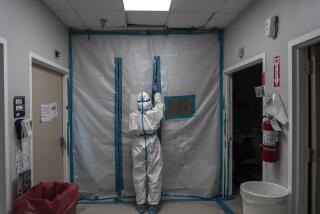West Nile virus: Rain halts aerial sprays in deadly Texas outbreak
HOUSTON -- Planes equipped to battle the West Nile outbreak in Texas have been grounded by rain, delaying the aerial application of pesticide targeting the deadly virus that has prompted a state of emergency in Dallas County, officials said.
So far, Dallas County has reported 242 West Nile infections and 10 deaths, making it the epicenter of a statewide surge in infections.
Texas has reported 552 cases and 21 deaths, by far the highest tally nationwide, according to the Centers for Disease Control and Prevention. Some officials blame an unusually warm North Texas winter followed by a wet spring for increasing the local mosquito population and with it, West Nile infections.
Storms forced the four planes to land at 12:20 a.m., Dallas County spokeswoman Maria Arita told The Times. Spraying had been scheduled to continue Saturday night, but with more rain in the forecast, Arita said the spraying was canceled. It was not clear when it would resume.
Dallas County Judge Clay Jenkins and other local officials were expected to hold a noon briefing Sunday to discuss aerial spraying plans.
Planes began spraying the area with a pyrethrin-based pesticide called Duet late Friday, but had to land early then, too, hampered by rain. Their flights marked the first aerial pesticide spraying in the area in more than 45 years, a process that has proved controversial, with some residents speaking out at a city council meeting and circulating petitions to stop it that had more than 1,900 signatures Saturday.
Although some Dallas County cities have opted against spraying, many officials have stood behind spraying, saying they consulted with counterparts in Sacramento and other parts of the country who have sprayed for years and seen no health risks.
ALSO:
Wyatt Earp, tough guy, poses in family photo
West Nile virus: How do I know if I am infected?
Children’s deaths in hot cars refocus federal safety awareness
molly.hennessy-fiske@latimes.com
More to Read
Sign up for Essential California
The most important California stories and recommendations in your inbox every morning.
You may occasionally receive promotional content from the Los Angeles Times.











